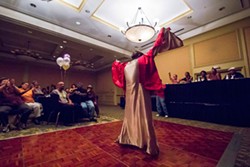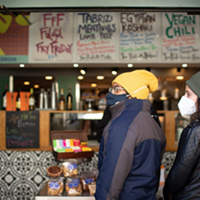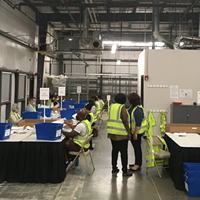Party people at the Transfaith in Color Conference 2012
Charlotte celebrates its transgender community in style
By Joanne Spataro @lookitsjoanneOn Saturday, a woman in a black and lime tunic watched the hotel staff lay down flooring in an empty ballroom. It seems the floor is not big enough to hold even a small wedding reception, let alone the full-on dance party Charlene Archilla is describing in a soft voice. But for Archilla, 49, the space is more than enough room for Sweet-T: The Mini Ball, where she will don a red and white kimono and lip-synch to Whitney Houston's version of "I Will Always Love You," as the audience showers her in dollar bills and kisses.
Archilla is not a drag queen. She's a transgender African American.
The ball capped off a day of workshops at the annual Transfaith in Color Conference 2012, held in the Hilton Hotel at University Place from Friday, Aug. 17 through Sunday, Aug. 19. The event brought together members of the transgender community as well as LGBT allies from all over the country, including Charlotte's Mayor Anthony Foxx, who accepted the Ally Award at the Saturday luncheon for his support of LGBT rights.
"The value every human being brings to this world is something we should cherish," said Foxx to the 300 conference attendees.
Bishop Tonyia Rawls, founder and CEO of The Freedom Center for Social Justice, has hosted the event in Charlotte since last year. The seed for the annual gathering of transgenders and their allies — most of whom are African American, Latino or other ethnic minorities — took root in 2009 after similar meetings were held in Los Angeles. The goal was to allow transgenders to learn about themselves through seminars and a presentation that awards activists within the community.
"We have to provide safe space for our trans neighbors to be able to live a good quality of life in this beautiful city," Rawls said. "There has got to be space for this population."
Although there are no hard statistics of living conditions for transgenders of color in Charlotte, national statistics show they fare much worse in daily life than their white counterparts. Latino transgenders had an unemployment rate of 20 percent in 2011, 14 percent higher than the overall transgender community, according to a National Transgender Discrimination Survey. African-American transgenders experienced a 26-percent unemployment rate in the same survey, two times the rate of the overall sample and four times that of the general population.
The survey goes on to report high unemployment puts transgender people of color at a higher risk of HIV infection, drug and alcohol use, and suicide attempts than the general population. Racism and discrimination from both outside and within their communities contribute to these high unemployment rates.
"I don't have anyone to be in the same boat I am [in terms of] the way race affects others," said Grey Shane, 19, whose descendants come from Greece and Africa. "And you notice your surroundings, and your environment, is kind of hard to deal with." Shane started hormone therapy in his transition from female to male a few months ago.
The Transfaith conference offered solutions to closing the gap on transgender isolation. Kylar Broadus, executive director of the Trans People of Color Coalition, is the first openly transgender person to work at the Human Rights Campaign in Washington, D.C. Broadus, a vocal supporter of writing transgender rights into the Employment Non-Discrimination Act, is working on a national hotline for transgender people of color.
"There isn't a place to call if you're thinking about killing yourself or [want to] find someone who can relate to you," Broadus said. "I just don't think we've come there in the trans community because we emulate the greater society, so the trans power is white with a few of us sprinkled in. Those concerns get missed."
By night, conference attendees let loose at Sweet-T: The Mini Ball, where they performed against (and with) each other for prizes. They writhed and showed off on the dance floor to heavy rap, punctuated by the announcer's raucous cry of "Clap, bitches, clap!" They competed in a "realness" competition to battle over who looked the most like a biological man or woman, complete with booty and breast shaking.
But perhaps the most important part of Sweet-T was how it connected transgender people with the rest of the rainbow, including lesbians and gay men.
As the evening ball came to a close, Archilla stretched out her arms, wrapped in the red and white kimono, and mime-belted the last lyrics of a song. A transgender man in a baseball cap came to her side and gave her a dollar bill — and a kiss.
"It's loving and it's caring and it's just fun to see them create creativity together," Archilla said.
Speaking of...
Latest in News Feature
More by Joanne Spataro
-
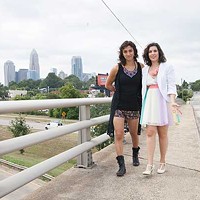
Everybody Needs Somebody, Even the Nacho Slobs
Feb 8, 2017 -

Batman gets spanked at Purgatory
May 27, 2015 -
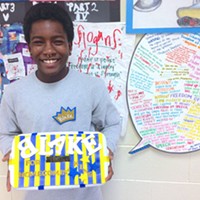
His name was Blake
Mar 25, 2015 - More »
Calendar
-

NEW WINDOW GALLERY-Pat Rhea-ACRYLIC PAINTINGS-April 05-30 2024 VALDESE, NC 28690 @ New Window Gallery/Play It Again Records
- Through April 30, 12 p.m.
-

TheDiscountCodes
-

"Blood Residue Analysis of Paleoamerican Stone Tools in the Carolinas" @ Native American Studies Center
- Fri., April 26, 12-1 p.m.
-

Brightfire Music and Arts Festival @ GreenLife Family Farms
-

ARTS RENAISSANCE, a GALA supporting the ARTS in South Carolina @ the Columbia Museum of ART
-
5 Online Player Communities to Join in Michigan
-
I Changed my Sex. Now What?
Scott Turner Schofield's rapid transit to a new identity
-
A beginners guide to online sports betting in the US

